Nivolumab: Pharmacology Report on Cancer Treatment and Immunotherapy
VerifiedAdded on 2022/09/16
|14
|3574
|16
Report
AI Summary
This comprehensive pharmacology report examines Nivolumab, a human immunoglobulinG4 monoclonal antibody, focusing on its application in treating non-small cell lung cancer and other cancers. The report includes a case study of a 46-year-old patient, Mr. A, who was diagnosed with non-small cell lung cancer and treated with Nivolumab after chemotherapy. The discussion covers the drug's generic and trade names (Opdivo), FDA approval, mechanism of action, pharmacokinetics (absorption, distribution, metabolism, and elimination), pharmacodynamics, usual route and dosing, common and serious side effects, patient education, cost analysis, and drug interactions with Ipilimumab and Pembrolizumab. The report also includes a simulated discussion with a pharmaceutical representative, highlighting the drug's development, dose-dependent efficacy, and its role as a second-line treatment option. The report references various studies and clinical trials to support its findings, offering a detailed overview of Nivolumab's pharmacology and clinical applications. The report also included the discussion on the combination therapy with other drugs and pharmaceutical representative's opinion on the drug.
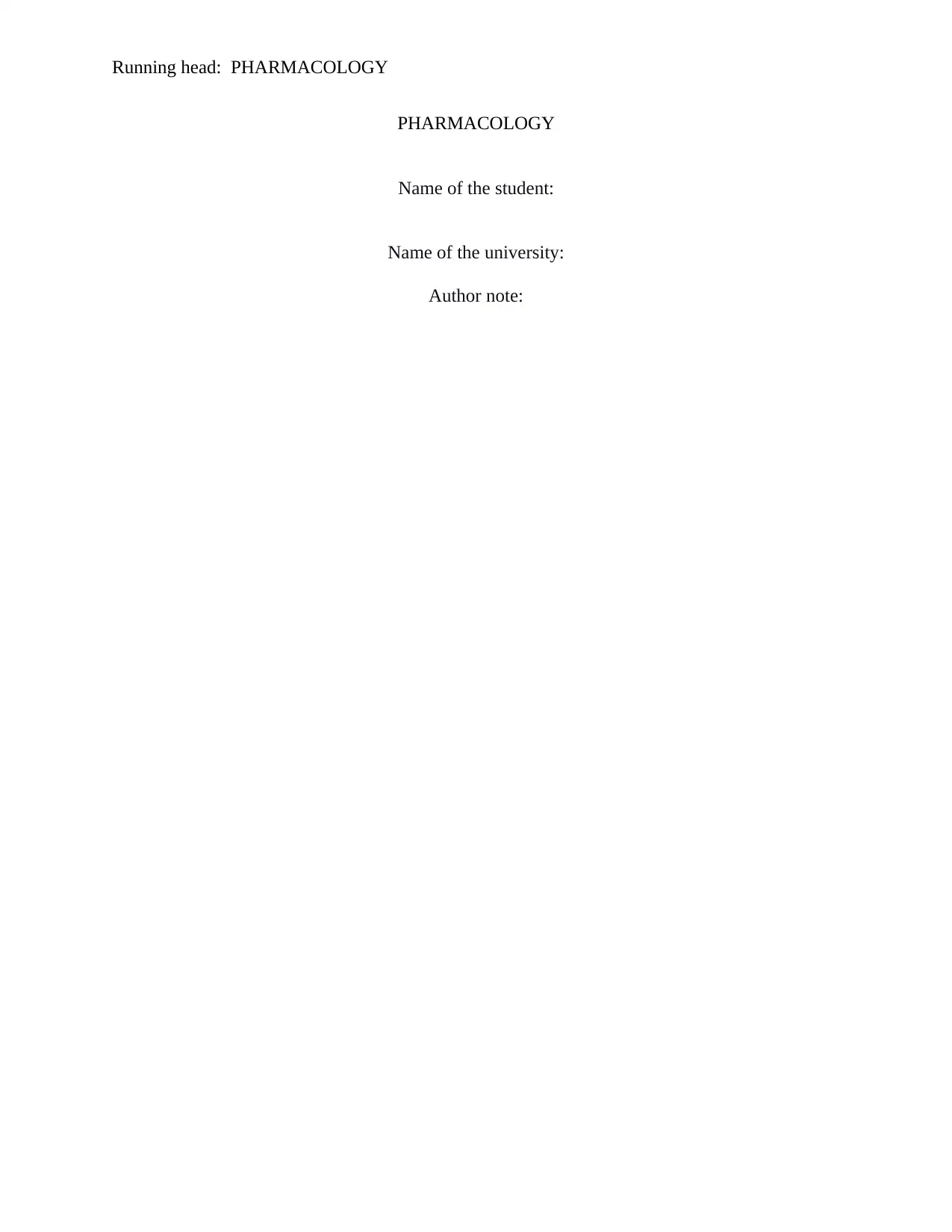
Running head: PHARMACOLOGY
PHARMACOLOGY
Name of the student:
Name of the university:
Author note:
PHARMACOLOGY
Name of the student:
Name of the university:
Author note:
Paraphrase This Document
Need a fresh take? Get an instant paraphrase of this document with our AI Paraphraser
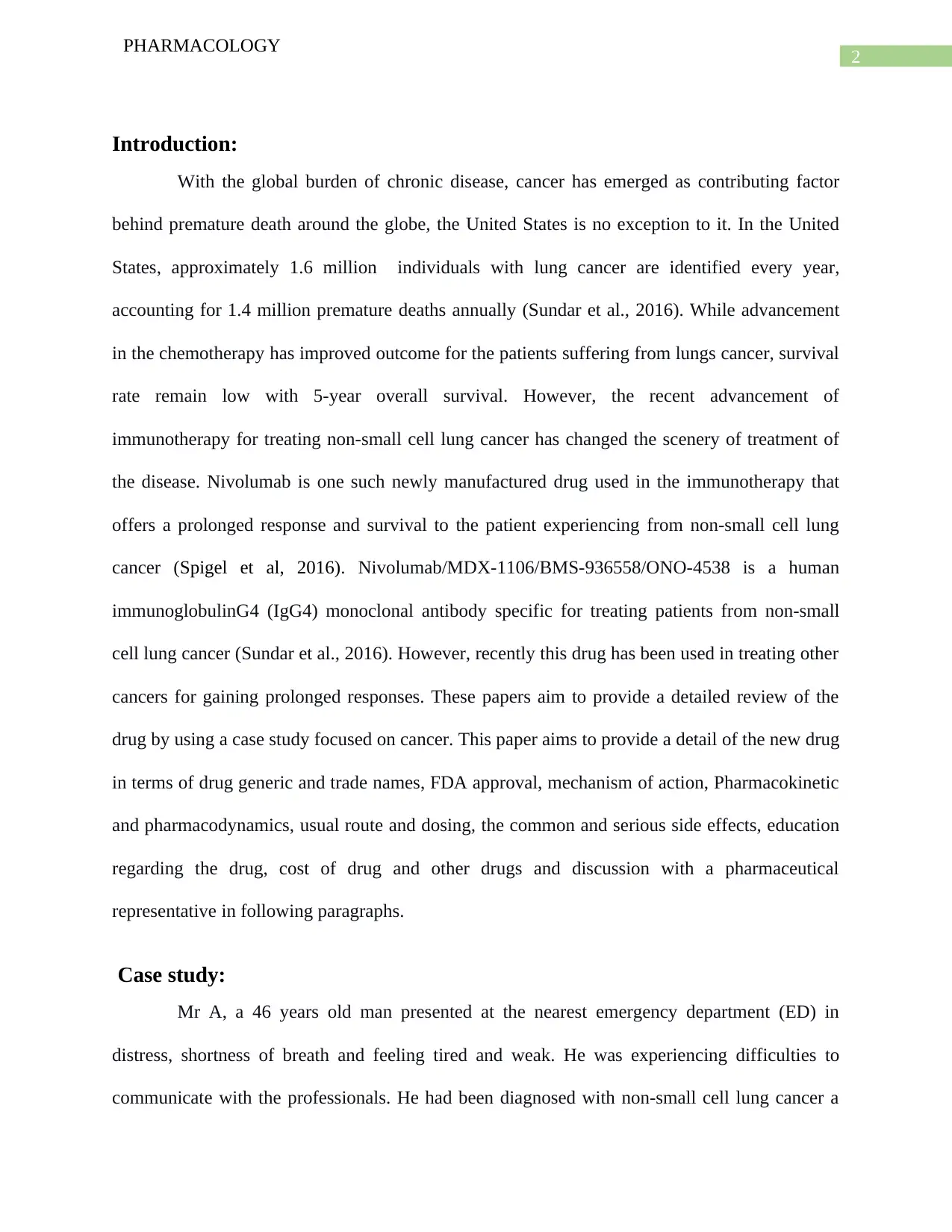
2
PHARMACOLOGY
Introduction:
With the global burden of chronic disease, cancer has emerged as contributing factor
behind premature death around the globe, the United States is no exception to it. In the United
States, approximately 1.6 million individuals with lung cancer are identified every year,
accounting for 1.4 million premature deaths annually (Sundar et al., 2016). While advancement
in the chemotherapy has improved outcome for the patients suffering from lungs cancer, survival
rate remain low with 5-year overall survival. However, the recent advancement of
immunotherapy for treating non-small cell lung cancer has changed the scenery of treatment of
the disease. Nivolumab is one such newly manufactured drug used in the immunotherapy that
offers a prolonged response and survival to the patient experiencing from non-small cell lung
cancer (Spigel et al, 2016). Nivolumab/MDX-1106/BMS-936558/ONO-4538 is a human
immunoglobulinG4 (IgG4) monoclonal antibody specific for treating patients from non-small
cell lung cancer (Sundar et al., 2016). However, recently this drug has been used in treating other
cancers for gaining prolonged responses. These papers aim to provide a detailed review of the
drug by using a case study focused on cancer. This paper aims to provide a detail of the new drug
in terms of drug generic and trade names, FDA approval, mechanism of action, Pharmacokinetic
and pharmacodynamics, usual route and dosing, the common and serious side effects, education
regarding the drug, cost of drug and other drugs and discussion with a pharmaceutical
representative in following paragraphs.
Case study:
Mr A, a 46 years old man presented at the nearest emergency department (ED) in
distress, shortness of breath and feeling tired and weak. He was experiencing difficulties to
communicate with the professionals. He had been diagnosed with non-small cell lung cancer a
PHARMACOLOGY
Introduction:
With the global burden of chronic disease, cancer has emerged as contributing factor
behind premature death around the globe, the United States is no exception to it. In the United
States, approximately 1.6 million individuals with lung cancer are identified every year,
accounting for 1.4 million premature deaths annually (Sundar et al., 2016). While advancement
in the chemotherapy has improved outcome for the patients suffering from lungs cancer, survival
rate remain low with 5-year overall survival. However, the recent advancement of
immunotherapy for treating non-small cell lung cancer has changed the scenery of treatment of
the disease. Nivolumab is one such newly manufactured drug used in the immunotherapy that
offers a prolonged response and survival to the patient experiencing from non-small cell lung
cancer (Spigel et al, 2016). Nivolumab/MDX-1106/BMS-936558/ONO-4538 is a human
immunoglobulinG4 (IgG4) monoclonal antibody specific for treating patients from non-small
cell lung cancer (Sundar et al., 2016). However, recently this drug has been used in treating other
cancers for gaining prolonged responses. These papers aim to provide a detailed review of the
drug by using a case study focused on cancer. This paper aims to provide a detail of the new drug
in terms of drug generic and trade names, FDA approval, mechanism of action, Pharmacokinetic
and pharmacodynamics, usual route and dosing, the common and serious side effects, education
regarding the drug, cost of drug and other drugs and discussion with a pharmaceutical
representative in following paragraphs.
Case study:
Mr A, a 46 years old man presented at the nearest emergency department (ED) in
distress, shortness of breath and feeling tired and weak. He was experiencing difficulties to
communicate with the professionals. He had been diagnosed with non-small cell lung cancer a
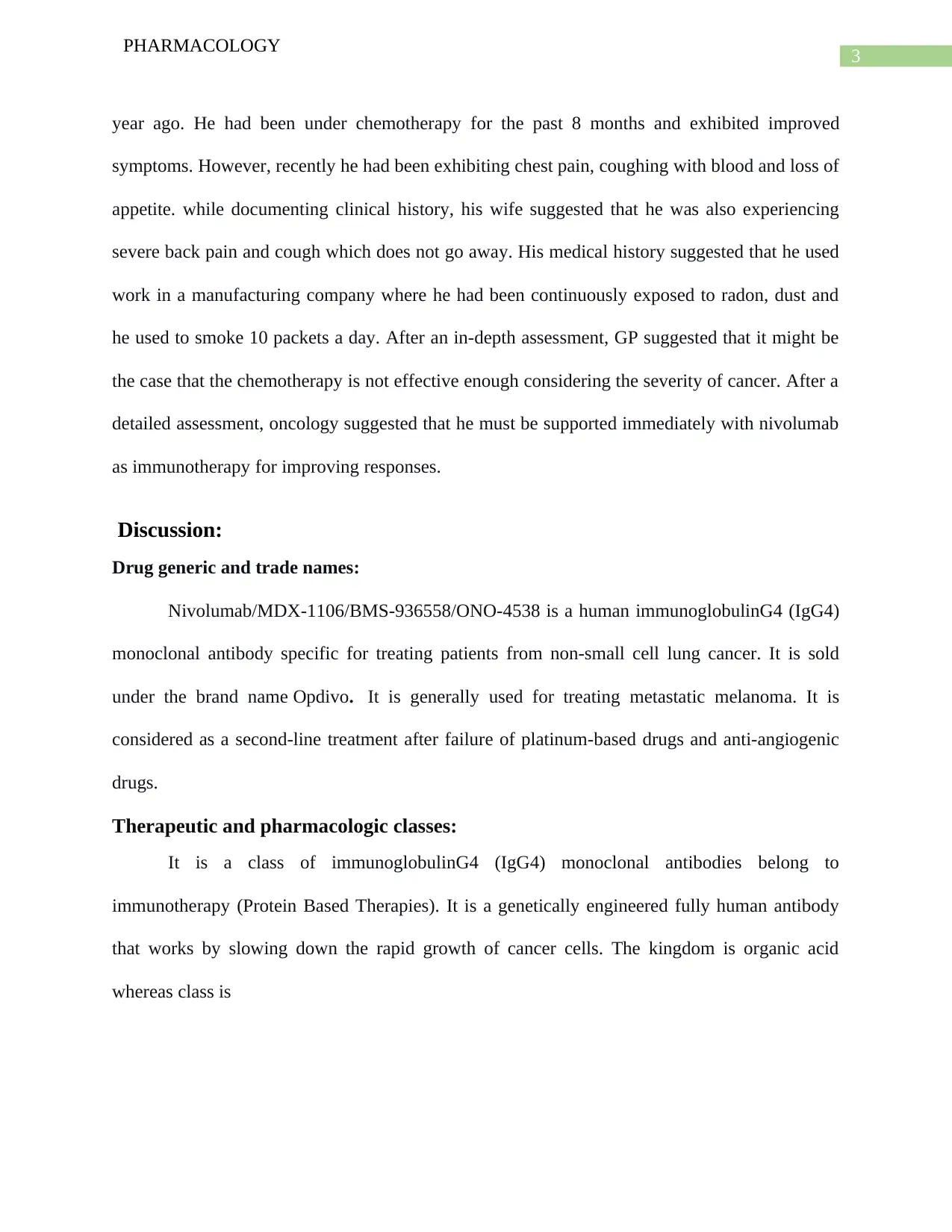
3
PHARMACOLOGY
year ago. He had been under chemotherapy for the past 8 months and exhibited improved
symptoms. However, recently he had been exhibiting chest pain, coughing with blood and loss of
appetite. while documenting clinical history, his wife suggested that he was also experiencing
severe back pain and cough which does not go away. His medical history suggested that he used
work in a manufacturing company where he had been continuously exposed to radon, dust and
he used to smoke 10 packets a day. After an in-depth assessment, GP suggested that it might be
the case that the chemotherapy is not effective enough considering the severity of cancer. After a
detailed assessment, oncology suggested that he must be supported immediately with nivolumab
as immunotherapy for improving responses.
Discussion:
Drug generic and trade names:
Nivolumab/MDX-1106/BMS-936558/ONO-4538 is a human immunoglobulinG4 (IgG4)
monoclonal antibody specific for treating patients from non-small cell lung cancer. It is sold
under the brand name Opdivo. It is generally used for treating metastatic melanoma. It is
considered as a second-line treatment after failure of platinum-based drugs and anti-angiogenic
drugs.
Therapeutic and pharmacologic classes:
It is a class of immunoglobulinG4 (IgG4) monoclonal antibodies belong to
immunotherapy (Protein Based Therapies). It is a genetically engineered fully human antibody
that works by slowing down the rapid growth of cancer cells. The kingdom is organic acid
whereas class is
PHARMACOLOGY
year ago. He had been under chemotherapy for the past 8 months and exhibited improved
symptoms. However, recently he had been exhibiting chest pain, coughing with blood and loss of
appetite. while documenting clinical history, his wife suggested that he was also experiencing
severe back pain and cough which does not go away. His medical history suggested that he used
work in a manufacturing company where he had been continuously exposed to radon, dust and
he used to smoke 10 packets a day. After an in-depth assessment, GP suggested that it might be
the case that the chemotherapy is not effective enough considering the severity of cancer. After a
detailed assessment, oncology suggested that he must be supported immediately with nivolumab
as immunotherapy for improving responses.
Discussion:
Drug generic and trade names:
Nivolumab/MDX-1106/BMS-936558/ONO-4538 is a human immunoglobulinG4 (IgG4)
monoclonal antibody specific for treating patients from non-small cell lung cancer. It is sold
under the brand name Opdivo. It is generally used for treating metastatic melanoma. It is
considered as a second-line treatment after failure of platinum-based drugs and anti-angiogenic
drugs.
Therapeutic and pharmacologic classes:
It is a class of immunoglobulinG4 (IgG4) monoclonal antibodies belong to
immunotherapy (Protein Based Therapies). It is a genetically engineered fully human antibody
that works by slowing down the rapid growth of cancer cells. The kingdom is organic acid
whereas class is
⊘ This is a preview!⊘
Do you want full access?
Subscribe today to unlock all pages.

Trusted by 1+ million students worldwide
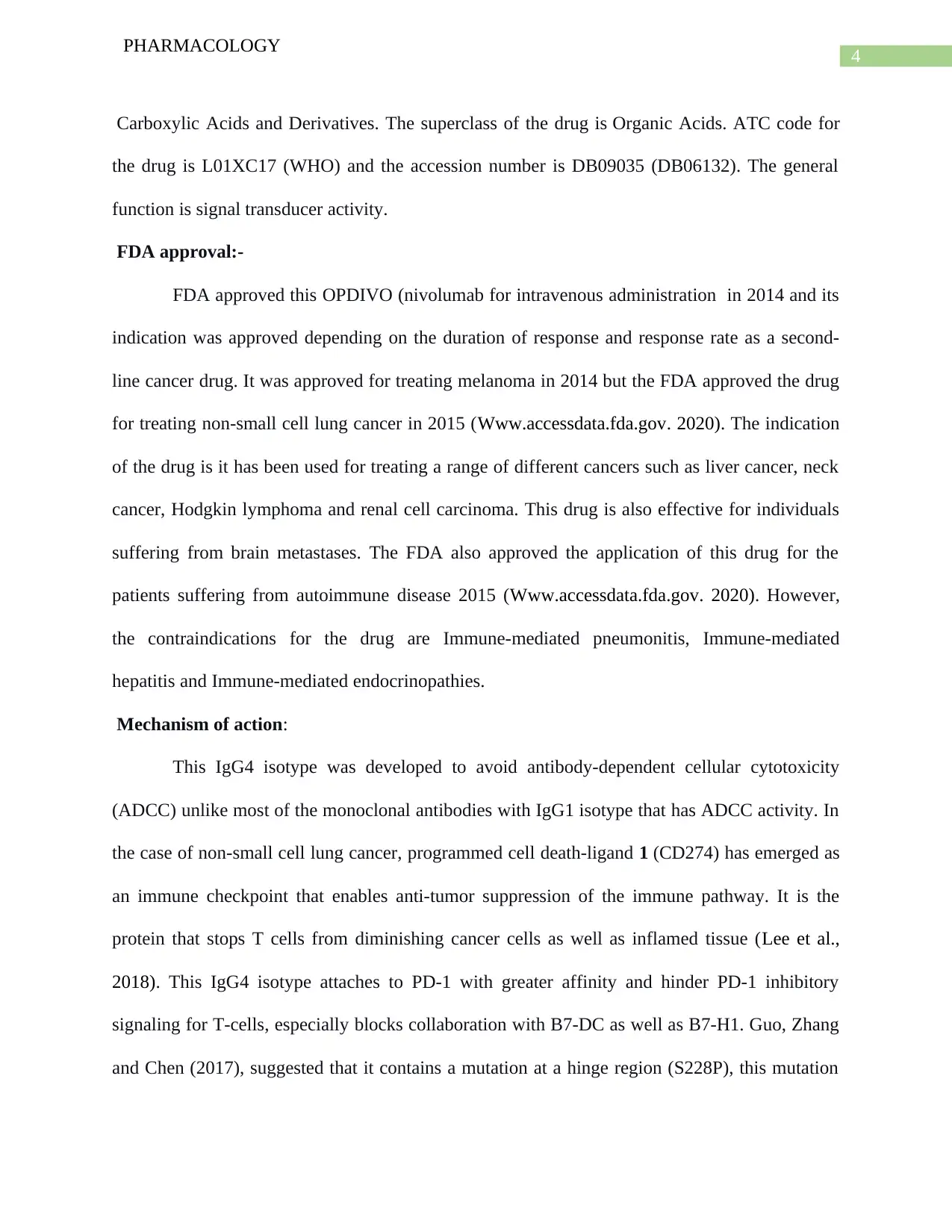
4
PHARMACOLOGY
Carboxylic Acids and Derivatives. The superclass of the drug is Organic Acids. ATC code for
the drug is L01XC17 (WHO) and the accession number is DB09035 (DB06132). The general
function is signal transducer activity.
FDA approval:-
FDA approved this OPDIVO (nivolumab for intravenous administration in 2014 and its
indication was approved depending on the duration of response and response rate as a second-
line cancer drug. It was approved for treating melanoma in 2014 but the FDA approved the drug
for treating non-small cell lung cancer in 2015 (Www.accessdata.fda.gov. 2020). The indication
of the drug is it has been used for treating a range of different cancers such as liver cancer, neck
cancer, Hodgkin lymphoma and renal cell carcinoma. This drug is also effective for individuals
suffering from brain metastases. The FDA also approved the application of this drug for the
patients suffering from autoimmune disease 2015 (Www.accessdata.fda.gov. 2020). However,
the contraindications for the drug are Immune-mediated pneumonitis, Immune-mediated
hepatitis and Immune-mediated endocrinopathies.
Mechanism of action:
This IgG4 isotype was developed to avoid antibody-dependent cellular cytotoxicity
(ADCC) unlike most of the monoclonal antibodies with IgG1 isotype that has ADCC activity. In
the case of non-small cell lung cancer, programmed cell death-ligand 1 (CD274) has emerged as
an immune checkpoint that enables anti-tumor suppression of the immune pathway. It is the
protein that stops T cells from diminishing cancer cells as well as inflamed tissue (Lee et al.,
2018). This IgG4 isotype attaches to PD-1 with greater affinity and hinder PD-1 inhibitory
signaling for T-cells, especially blocks collaboration with B7-DC as well as B7-H1. Guo, Zhang
and Chen (2017), suggested that it contains a mutation at a hinge region (S228P), this mutation
PHARMACOLOGY
Carboxylic Acids and Derivatives. The superclass of the drug is Organic Acids. ATC code for
the drug is L01XC17 (WHO) and the accession number is DB09035 (DB06132). The general
function is signal transducer activity.
FDA approval:-
FDA approved this OPDIVO (nivolumab for intravenous administration in 2014 and its
indication was approved depending on the duration of response and response rate as a second-
line cancer drug. It was approved for treating melanoma in 2014 but the FDA approved the drug
for treating non-small cell lung cancer in 2015 (Www.accessdata.fda.gov. 2020). The indication
of the drug is it has been used for treating a range of different cancers such as liver cancer, neck
cancer, Hodgkin lymphoma and renal cell carcinoma. This drug is also effective for individuals
suffering from brain metastases. The FDA also approved the application of this drug for the
patients suffering from autoimmune disease 2015 (Www.accessdata.fda.gov. 2020). However,
the contraindications for the drug are Immune-mediated pneumonitis, Immune-mediated
hepatitis and Immune-mediated endocrinopathies.
Mechanism of action:
This IgG4 isotype was developed to avoid antibody-dependent cellular cytotoxicity
(ADCC) unlike most of the monoclonal antibodies with IgG1 isotype that has ADCC activity. In
the case of non-small cell lung cancer, programmed cell death-ligand 1 (CD274) has emerged as
an immune checkpoint that enables anti-tumor suppression of the immune pathway. It is the
protein that stops T cells from diminishing cancer cells as well as inflamed tissue (Lee et al.,
2018). This IgG4 isotype attaches to PD-1 with greater affinity and hinder PD-1 inhibitory
signaling for T-cells, especially blocks collaboration with B7-DC as well as B7-H1. Guo, Zhang
and Chen (2017), suggested that it contains a mutation at a hinge region (S228P), this mutation
Paraphrase This Document
Need a fresh take? Get an instant paraphrase of this document with our AI Paraphraser
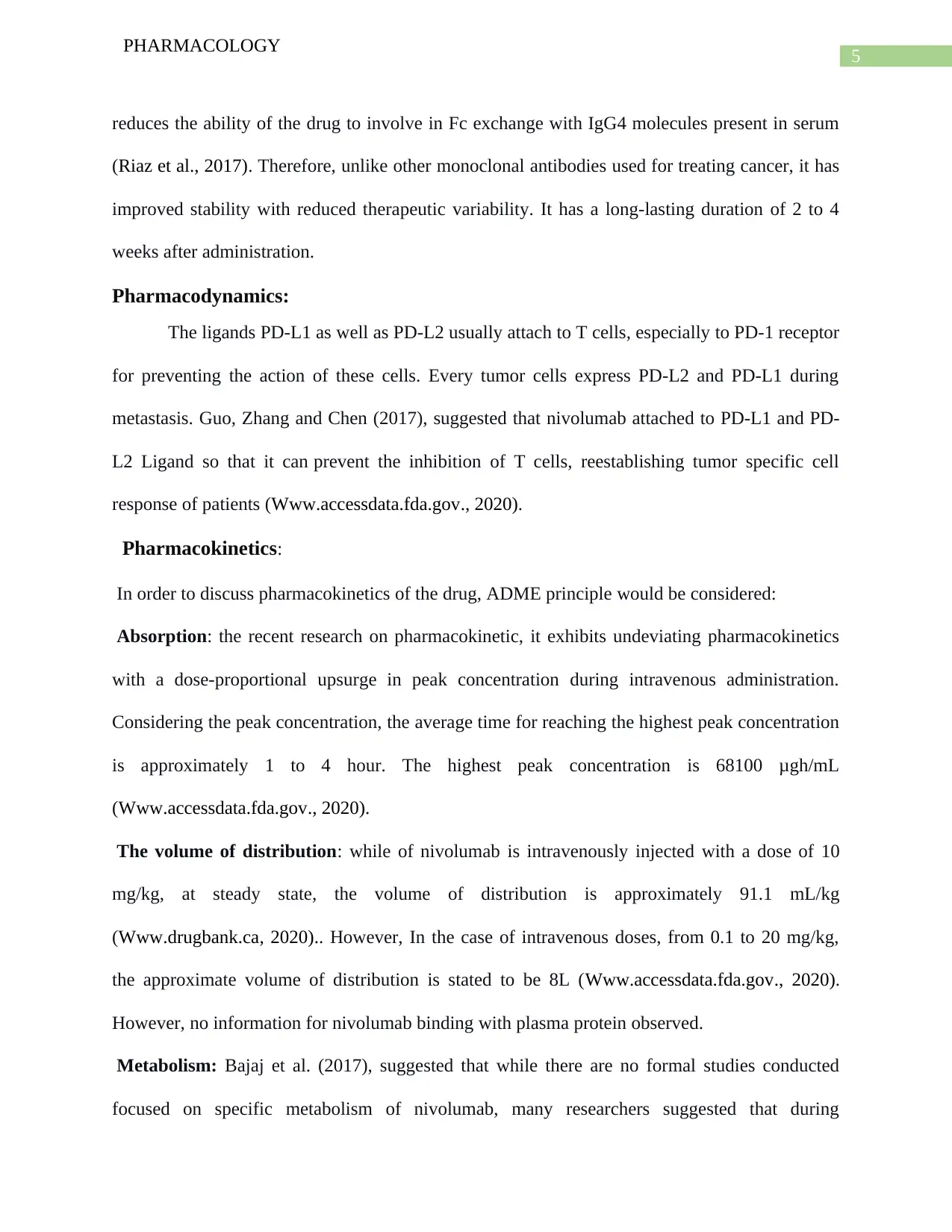
5
PHARMACOLOGY
reduces the ability of the drug to involve in Fc exchange with IgG4 molecules present in serum
(Riaz et al., 2017). Therefore, unlike other monoclonal antibodies used for treating cancer, it has
improved stability with reduced therapeutic variability. It has a long-lasting duration of 2 to 4
weeks after administration.
Pharmacodynamics:
The ligands PD-L1 as well as PD-L2 usually attach to T cells, especially to PD-1 receptor
for preventing the action of these cells. Every tumor cells express PD-L2 and PD-L1 during
metastasis. Guo, Zhang and Chen (2017), suggested that nivolumab attached to PD-L1 and PD-
L2 Ligand so that it can prevent the inhibition of T cells, reestablishing tumor specific cell
response of patients (Www.accessdata.fda.gov., 2020).
Pharmacokinetics:
In order to discuss pharmacokinetics of the drug, ADME principle would be considered:
Absorption: the recent research on pharmacokinetic, it exhibits undeviating pharmacokinetics
with a dose-proportional upsurge in peak concentration during intravenous administration.
Considering the peak concentration, the average time for reaching the highest peak concentration
is approximately 1 to 4 hour. The highest peak concentration is 68100 μgh/mL
(Www.accessdata.fda.gov., 2020).
The volume of distribution: while of nivolumab is intravenously injected with a dose of 10
mg/kg, at steady state, the volume of distribution is approximately 91.1 mL/kg
(Www.drugbank.ca, 2020).. However, In the case of intravenous doses, from 0.1 to 20 mg/kg,
the approximate volume of distribution is stated to be 8L (Www.accessdata.fda.gov., 2020).
However, no information for nivolumab binding with plasma protein observed.
Metabolism: Bajaj et al. (2017), suggested that while there are no formal studies conducted
focused on specific metabolism of nivolumab, many researchers suggested that during
PHARMACOLOGY
reduces the ability of the drug to involve in Fc exchange with IgG4 molecules present in serum
(Riaz et al., 2017). Therefore, unlike other monoclonal antibodies used for treating cancer, it has
improved stability with reduced therapeutic variability. It has a long-lasting duration of 2 to 4
weeks after administration.
Pharmacodynamics:
The ligands PD-L1 as well as PD-L2 usually attach to T cells, especially to PD-1 receptor
for preventing the action of these cells. Every tumor cells express PD-L2 and PD-L1 during
metastasis. Guo, Zhang and Chen (2017), suggested that nivolumab attached to PD-L1 and PD-
L2 Ligand so that it can prevent the inhibition of T cells, reestablishing tumor specific cell
response of patients (Www.accessdata.fda.gov., 2020).
Pharmacokinetics:
In order to discuss pharmacokinetics of the drug, ADME principle would be considered:
Absorption: the recent research on pharmacokinetic, it exhibits undeviating pharmacokinetics
with a dose-proportional upsurge in peak concentration during intravenous administration.
Considering the peak concentration, the average time for reaching the highest peak concentration
is approximately 1 to 4 hour. The highest peak concentration is 68100 μgh/mL
(Www.accessdata.fda.gov., 2020).
The volume of distribution: while of nivolumab is intravenously injected with a dose of 10
mg/kg, at steady state, the volume of distribution is approximately 91.1 mL/kg
(Www.drugbank.ca, 2020).. However, In the case of intravenous doses, from 0.1 to 20 mg/kg,
the approximate volume of distribution is stated to be 8L (Www.accessdata.fda.gov., 2020).
However, no information for nivolumab binding with plasma protein observed.
Metabolism: Bajaj et al. (2017), suggested that while there are no formal studies conducted
focused on specific metabolism of nivolumab, many researchers suggested that during
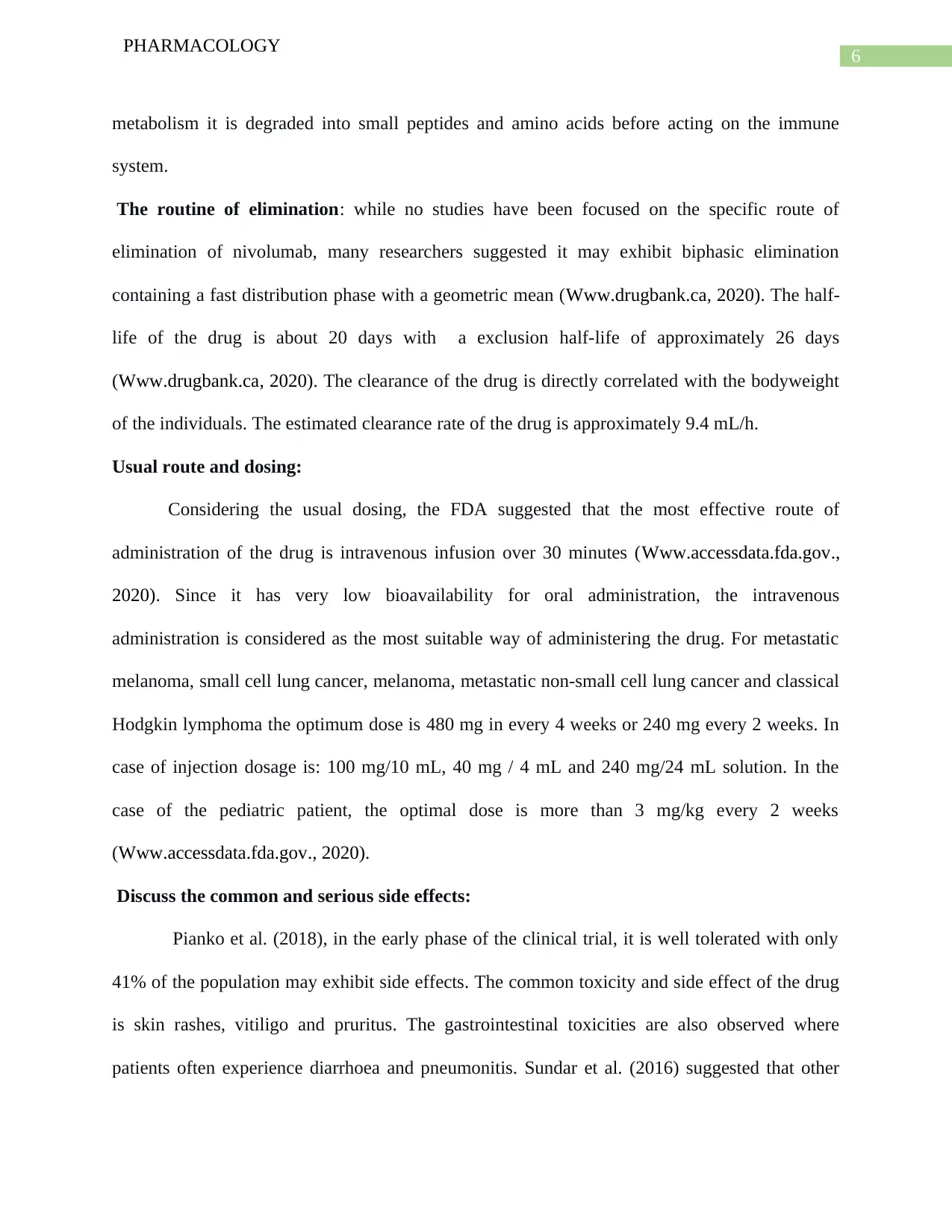
6
PHARMACOLOGY
metabolism it is degraded into small peptides and amino acids before acting on the immune
system.
The routine of elimination: while no studies have been focused on the specific route of
elimination of nivolumab, many researchers suggested it may exhibit biphasic elimination
containing a fast distribution phase with a geometric mean (Www.drugbank.ca, 2020). The half-
life of the drug is about 20 days with a exclusion half-life of approximately 26 days
(Www.drugbank.ca, 2020). The clearance of the drug is directly correlated with the bodyweight
of the individuals. The estimated clearance rate of the drug is approximately 9.4 mL/h.
Usual route and dosing:
Considering the usual dosing, the FDA suggested that the most effective route of
administration of the drug is intravenous infusion over 30 minutes (Www.accessdata.fda.gov.,
2020). Since it has very low bioavailability for oral administration, the intravenous
administration is considered as the most suitable way of administering the drug. For metastatic
melanoma, small cell lung cancer, melanoma, metastatic non-small cell lung cancer and classical
Hodgkin lymphoma the optimum dose is 480 mg in every 4 weeks or 240 mg every 2 weeks. In
case of injection dosage is: 100 mg/10 mL, 40 mg / 4 mL and 240 mg/24 mL solution. In the
case of the pediatric patient, the optimal dose is more than 3 mg/kg every 2 weeks
(Www.accessdata.fda.gov., 2020).
Discuss the common and serious side effects:
Pianko et al. (2018), in the early phase of the clinical trial, it is well tolerated with only
41% of the population may exhibit side effects. The common toxicity and side effect of the drug
is skin rashes, vitiligo and pruritus. The gastrointestinal toxicities are also observed where
patients often experience diarrhoea and pneumonitis. Sundar et al. (2016) suggested that other
PHARMACOLOGY
metabolism it is degraded into small peptides and amino acids before acting on the immune
system.
The routine of elimination: while no studies have been focused on the specific route of
elimination of nivolumab, many researchers suggested it may exhibit biphasic elimination
containing a fast distribution phase with a geometric mean (Www.drugbank.ca, 2020). The half-
life of the drug is about 20 days with a exclusion half-life of approximately 26 days
(Www.drugbank.ca, 2020). The clearance of the drug is directly correlated with the bodyweight
of the individuals. The estimated clearance rate of the drug is approximately 9.4 mL/h.
Usual route and dosing:
Considering the usual dosing, the FDA suggested that the most effective route of
administration of the drug is intravenous infusion over 30 minutes (Www.accessdata.fda.gov.,
2020). Since it has very low bioavailability for oral administration, the intravenous
administration is considered as the most suitable way of administering the drug. For metastatic
melanoma, small cell lung cancer, melanoma, metastatic non-small cell lung cancer and classical
Hodgkin lymphoma the optimum dose is 480 mg in every 4 weeks or 240 mg every 2 weeks. In
case of injection dosage is: 100 mg/10 mL, 40 mg / 4 mL and 240 mg/24 mL solution. In the
case of the pediatric patient, the optimal dose is more than 3 mg/kg every 2 weeks
(Www.accessdata.fda.gov., 2020).
Discuss the common and serious side effects:
Pianko et al. (2018), in the early phase of the clinical trial, it is well tolerated with only
41% of the population may exhibit side effects. The common toxicity and side effect of the drug
is skin rashes, vitiligo and pruritus. The gastrointestinal toxicities are also observed where
patients often experience diarrhoea and pneumonitis. Sundar et al. (2016) suggested that other
⊘ This is a preview!⊘
Do you want full access?
Subscribe today to unlock all pages.

Trusted by 1+ million students worldwide
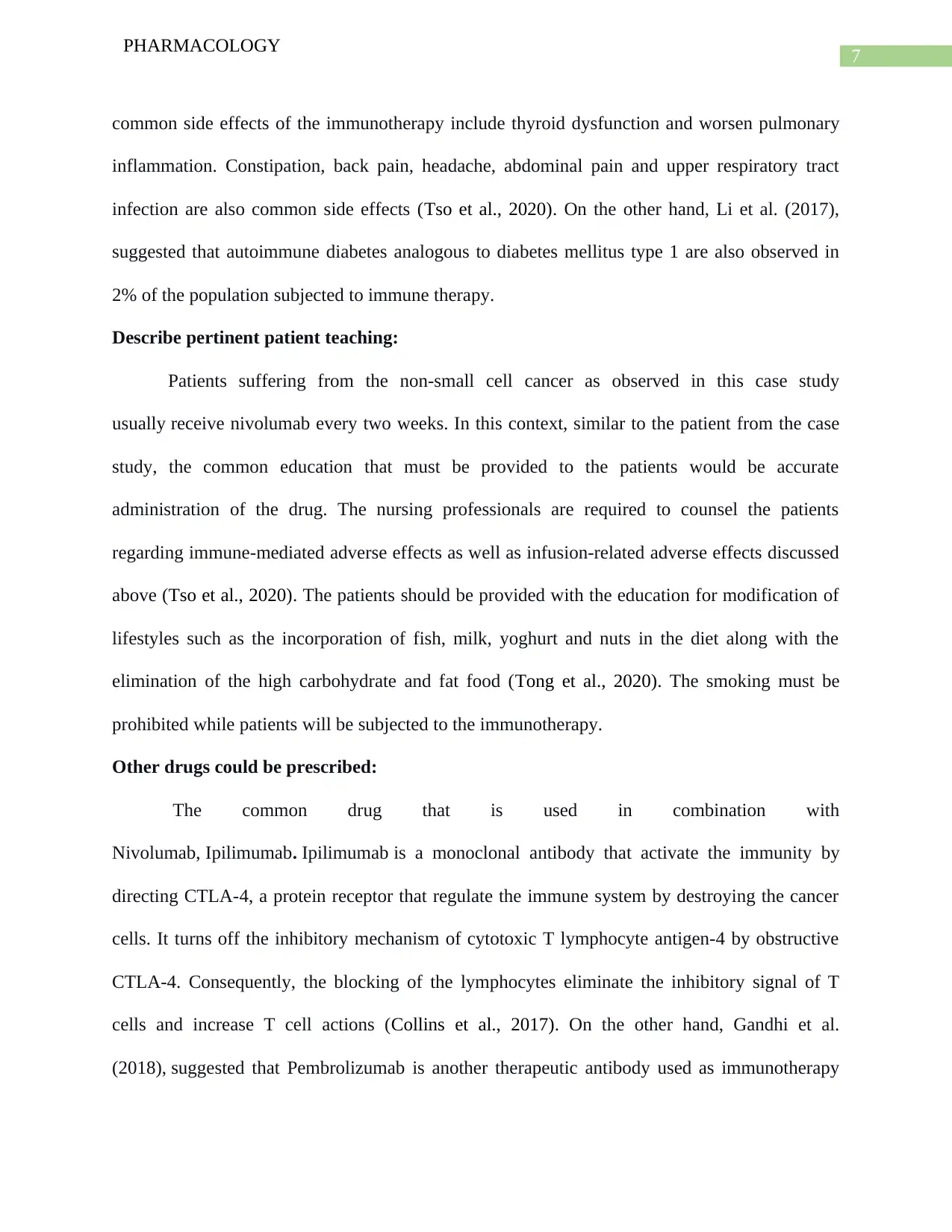
7
PHARMACOLOGY
common side effects of the immunotherapy include thyroid dysfunction and worsen pulmonary
inflammation. Constipation, back pain, headache, abdominal pain and upper respiratory tract
infection are also common side effects (Tso et al., 2020). On the other hand, Li et al. (2017),
suggested that autoimmune diabetes analogous to diabetes mellitus type 1 are also observed in
2% of the population subjected to immune therapy.
Describe pertinent patient teaching:
Patients suffering from the non-small cell cancer as observed in this case study
usually receive nivolumab every two weeks. In this context, similar to the patient from the case
study, the common education that must be provided to the patients would be accurate
administration of the drug. The nursing professionals are required to counsel the patients
regarding immune-mediated adverse effects as well as infusion-related adverse effects discussed
above (Tso et al., 2020). The patients should be provided with the education for modification of
lifestyles such as the incorporation of fish, milk, yoghurt and nuts in the diet along with the
elimination of the high carbohydrate and fat food (Tong et al., 2020). The smoking must be
prohibited while patients will be subjected to the immunotherapy.
Other drugs could be prescribed:
The common drug that is used in combination with
Nivolumab, Ipilimumab. Ipilimumab is a monoclonal antibody that activate the immunity by
directing CTLA-4, a protein receptor that regulate the immune system by destroying the cancer
cells. It turns off the inhibitory mechanism of cytotoxic T lymphocyte antigen-4 by obstructive
CTLA-4. Consequently, the blocking of the lymphocytes eliminate the inhibitory signal of T
cells and increase T cell actions (Collins et al., 2017). On the other hand, Gandhi et al.
(2018), suggested that Pembrolizumab is another therapeutic antibody used as immunotherapy
PHARMACOLOGY
common side effects of the immunotherapy include thyroid dysfunction and worsen pulmonary
inflammation. Constipation, back pain, headache, abdominal pain and upper respiratory tract
infection are also common side effects (Tso et al., 2020). On the other hand, Li et al. (2017),
suggested that autoimmune diabetes analogous to diabetes mellitus type 1 are also observed in
2% of the population subjected to immune therapy.
Describe pertinent patient teaching:
Patients suffering from the non-small cell cancer as observed in this case study
usually receive nivolumab every two weeks. In this context, similar to the patient from the case
study, the common education that must be provided to the patients would be accurate
administration of the drug. The nursing professionals are required to counsel the patients
regarding immune-mediated adverse effects as well as infusion-related adverse effects discussed
above (Tso et al., 2020). The patients should be provided with the education for modification of
lifestyles such as the incorporation of fish, milk, yoghurt and nuts in the diet along with the
elimination of the high carbohydrate and fat food (Tong et al., 2020). The smoking must be
prohibited while patients will be subjected to the immunotherapy.
Other drugs could be prescribed:
The common drug that is used in combination with
Nivolumab, Ipilimumab. Ipilimumab is a monoclonal antibody that activate the immunity by
directing CTLA-4, a protein receptor that regulate the immune system by destroying the cancer
cells. It turns off the inhibitory mechanism of cytotoxic T lymphocyte antigen-4 by obstructive
CTLA-4. Consequently, the blocking of the lymphocytes eliminate the inhibitory signal of T
cells and increase T cell actions (Collins et al., 2017). On the other hand, Gandhi et al.
(2018), suggested that Pembrolizumab is another therapeutic antibody used as immunotherapy
Paraphrase This Document
Need a fresh take? Get an instant paraphrase of this document with our AI Paraphraser
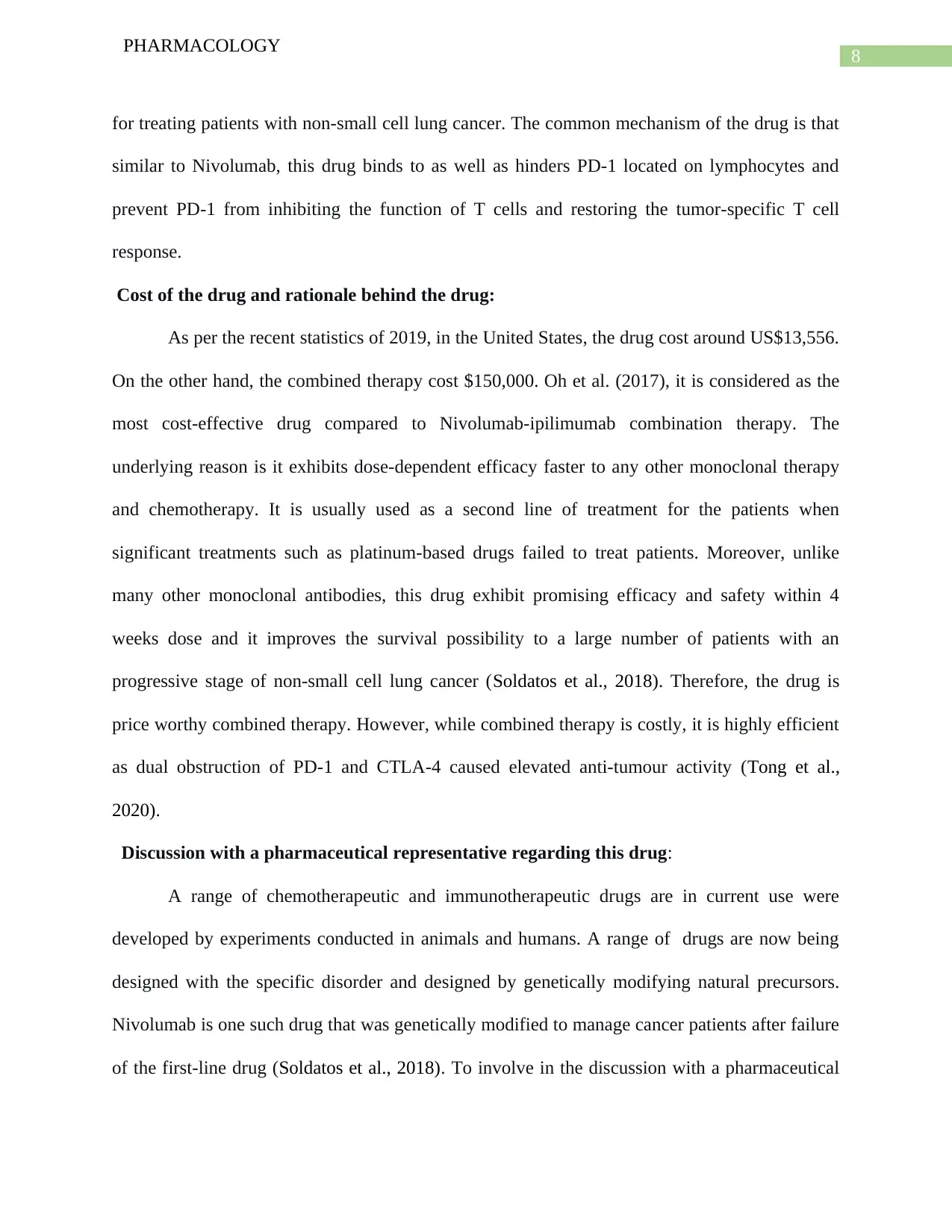
8
PHARMACOLOGY
for treating patients with non-small cell lung cancer. The common mechanism of the drug is that
similar to Nivolumab, this drug binds to as well as hinders PD-1 located on lymphocytes and
prevent PD-1 from inhibiting the function of T cells and restoring the tumor-specific T cell
response.
Cost of the drug and rationale behind the drug:
As per the recent statistics of 2019, in the United States, the drug cost around US$13,556.
On the other hand, the combined therapy cost $150,000. Oh et al. (2017), it is considered as the
most cost-effective drug compared to Nivolumab-ipilimumab combination therapy. The
underlying reason is it exhibits dose-dependent efficacy faster to any other monoclonal therapy
and chemotherapy. It is usually used as a second line of treatment for the patients when
significant treatments such as platinum-based drugs failed to treat patients. Moreover, unlike
many other monoclonal antibodies, this drug exhibit promising efficacy and safety within 4
weeks dose and it improves the survival possibility to a large number of patients with an
progressive stage of non-small cell lung cancer (Soldatos et al., 2018). Therefore, the drug is
price worthy combined therapy. However, while combined therapy is costly, it is highly efficient
as dual obstruction of PD-1 and CTLA-4 caused elevated anti-tumour activity (Tong et al.,
2020).
Discussion with a pharmaceutical representative regarding this drug:
A range of chemotherapeutic and immunotherapeutic drugs are in current use were
developed by experiments conducted in animals and humans. A range of drugs are now being
designed with the specific disorder and designed by genetically modifying natural precursors.
Nivolumab is one such drug that was genetically modified to manage cancer patients after failure
of the first-line drug (Soldatos et al., 2018). To involve in the discussion with a pharmaceutical
PHARMACOLOGY
for treating patients with non-small cell lung cancer. The common mechanism of the drug is that
similar to Nivolumab, this drug binds to as well as hinders PD-1 located on lymphocytes and
prevent PD-1 from inhibiting the function of T cells and restoring the tumor-specific T cell
response.
Cost of the drug and rationale behind the drug:
As per the recent statistics of 2019, in the United States, the drug cost around US$13,556.
On the other hand, the combined therapy cost $150,000. Oh et al. (2017), it is considered as the
most cost-effective drug compared to Nivolumab-ipilimumab combination therapy. The
underlying reason is it exhibits dose-dependent efficacy faster to any other monoclonal therapy
and chemotherapy. It is usually used as a second line of treatment for the patients when
significant treatments such as platinum-based drugs failed to treat patients. Moreover, unlike
many other monoclonal antibodies, this drug exhibit promising efficacy and safety within 4
weeks dose and it improves the survival possibility to a large number of patients with an
progressive stage of non-small cell lung cancer (Soldatos et al., 2018). Therefore, the drug is
price worthy combined therapy. However, while combined therapy is costly, it is highly efficient
as dual obstruction of PD-1 and CTLA-4 caused elevated anti-tumour activity (Tong et al.,
2020).
Discussion with a pharmaceutical representative regarding this drug:
A range of chemotherapeutic and immunotherapeutic drugs are in current use were
developed by experiments conducted in animals and humans. A range of drugs are now being
designed with the specific disorder and designed by genetically modifying natural precursors.
Nivolumab is one such drug that was genetically modified to manage cancer patients after failure
of the first-line drug (Soldatos et al., 2018). To involve in the discussion with a pharmaceutical
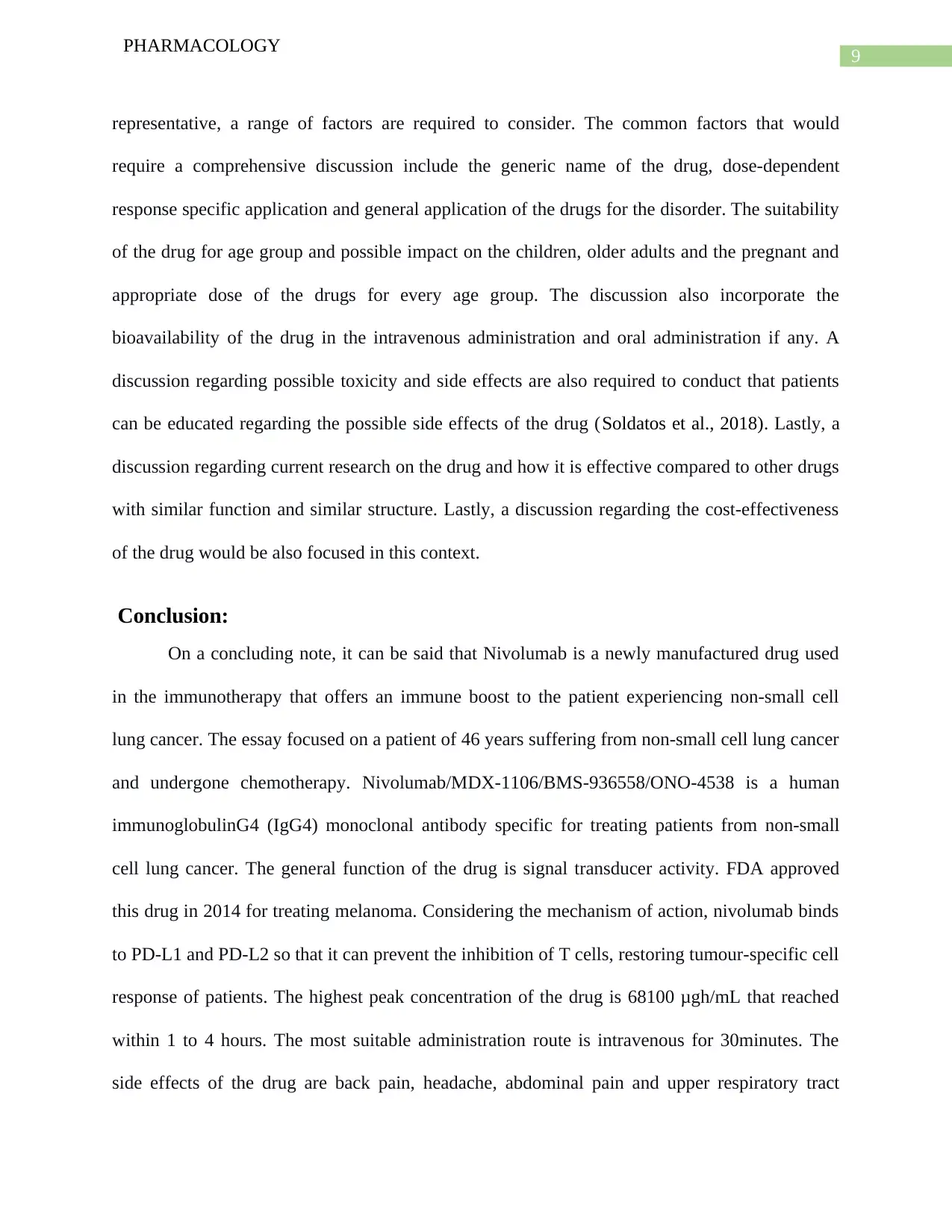
9
PHARMACOLOGY
representative, a range of factors are required to consider. The common factors that would
require a comprehensive discussion include the generic name of the drug, dose-dependent
response specific application and general application of the drugs for the disorder. The suitability
of the drug for age group and possible impact on the children, older adults and the pregnant and
appropriate dose of the drugs for every age group. The discussion also incorporate the
bioavailability of the drug in the intravenous administration and oral administration if any. A
discussion regarding possible toxicity and side effects are also required to conduct that patients
can be educated regarding the possible side effects of the drug (Soldatos et al., 2018). Lastly, a
discussion regarding current research on the drug and how it is effective compared to other drugs
with similar function and similar structure. Lastly, a discussion regarding the cost-effectiveness
of the drug would be also focused in this context.
Conclusion:
On a concluding note, it can be said that Nivolumab is a newly manufactured drug used
in the immunotherapy that offers an immune boost to the patient experiencing non-small cell
lung cancer. The essay focused on a patient of 46 years suffering from non-small cell lung cancer
and undergone chemotherapy. Nivolumab/MDX-1106/BMS-936558/ONO-4538 is a human
immunoglobulinG4 (IgG4) monoclonal antibody specific for treating patients from non-small
cell lung cancer. The general function of the drug is signal transducer activity. FDA approved
this drug in 2014 for treating melanoma. Considering the mechanism of action, nivolumab binds
to PD-L1 and PD-L2 so that it can prevent the inhibition of T cells, restoring tumour-specific cell
response of patients. The highest peak concentration of the drug is 68100 μgh/mL that reached
within 1 to 4 hours. The most suitable administration route is intravenous for 30minutes. The
side effects of the drug are back pain, headache, abdominal pain and upper respiratory tract
PHARMACOLOGY
representative, a range of factors are required to consider. The common factors that would
require a comprehensive discussion include the generic name of the drug, dose-dependent
response specific application and general application of the drugs for the disorder. The suitability
of the drug for age group and possible impact on the children, older adults and the pregnant and
appropriate dose of the drugs for every age group. The discussion also incorporate the
bioavailability of the drug in the intravenous administration and oral administration if any. A
discussion regarding possible toxicity and side effects are also required to conduct that patients
can be educated regarding the possible side effects of the drug (Soldatos et al., 2018). Lastly, a
discussion regarding current research on the drug and how it is effective compared to other drugs
with similar function and similar structure. Lastly, a discussion regarding the cost-effectiveness
of the drug would be also focused in this context.
Conclusion:
On a concluding note, it can be said that Nivolumab is a newly manufactured drug used
in the immunotherapy that offers an immune boost to the patient experiencing non-small cell
lung cancer. The essay focused on a patient of 46 years suffering from non-small cell lung cancer
and undergone chemotherapy. Nivolumab/MDX-1106/BMS-936558/ONO-4538 is a human
immunoglobulinG4 (IgG4) monoclonal antibody specific for treating patients from non-small
cell lung cancer. The general function of the drug is signal transducer activity. FDA approved
this drug in 2014 for treating melanoma. Considering the mechanism of action, nivolumab binds
to PD-L1 and PD-L2 so that it can prevent the inhibition of T cells, restoring tumour-specific cell
response of patients. The highest peak concentration of the drug is 68100 μgh/mL that reached
within 1 to 4 hours. The most suitable administration route is intravenous for 30minutes. The
side effects of the drug are back pain, headache, abdominal pain and upper respiratory tract
⊘ This is a preview!⊘
Do you want full access?
Subscribe today to unlock all pages.

Trusted by 1+ million students worldwide
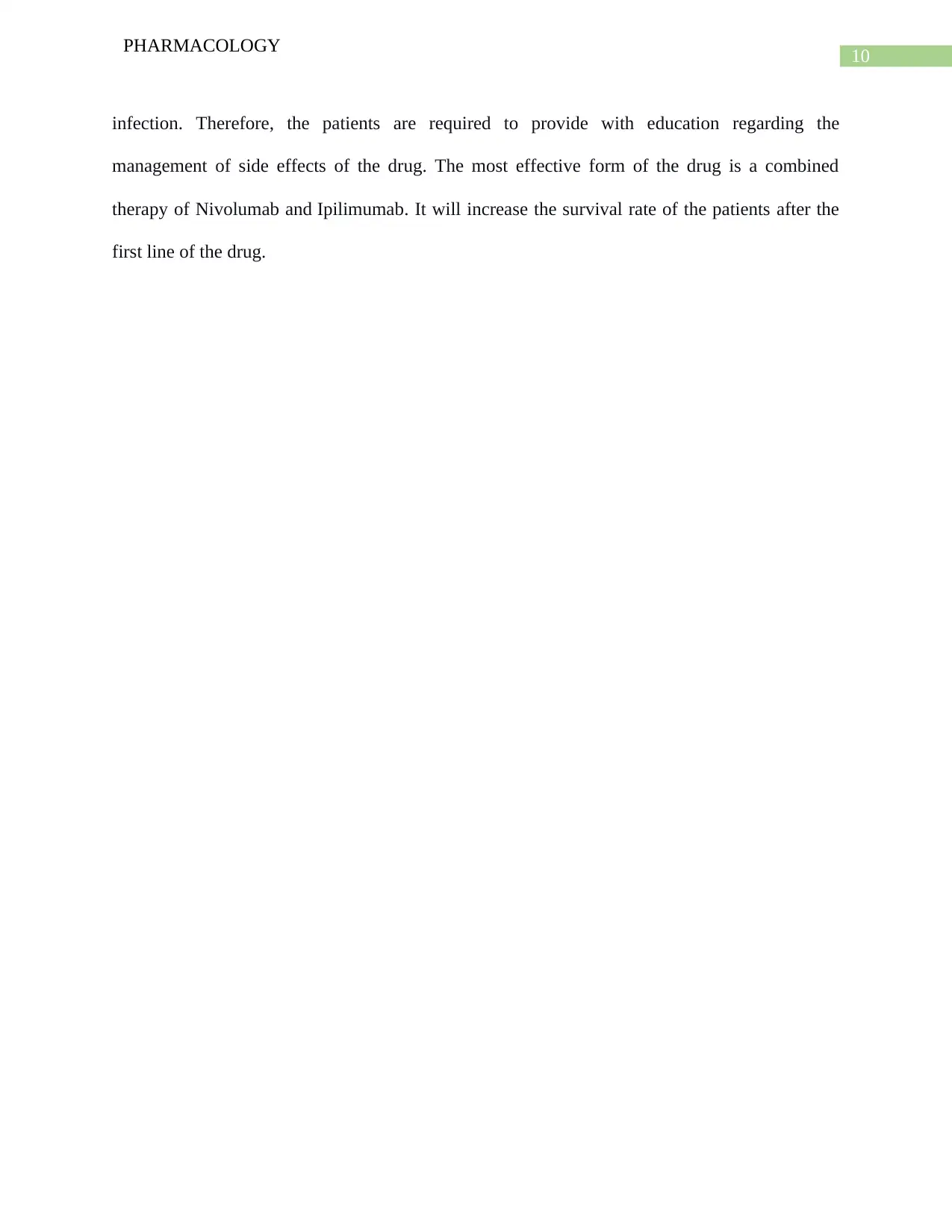
10
PHARMACOLOGY
infection. Therefore, the patients are required to provide with education regarding the
management of side effects of the drug. The most effective form of the drug is a combined
therapy of Nivolumab and Ipilimumab. It will increase the survival rate of the patients after the
first line of the drug.
PHARMACOLOGY
infection. Therefore, the patients are required to provide with education regarding the
management of side effects of the drug. The most effective form of the drug is a combined
therapy of Nivolumab and Ipilimumab. It will increase the survival rate of the patients after the
first line of the drug.
Paraphrase This Document
Need a fresh take? Get an instant paraphrase of this document with our AI Paraphraser
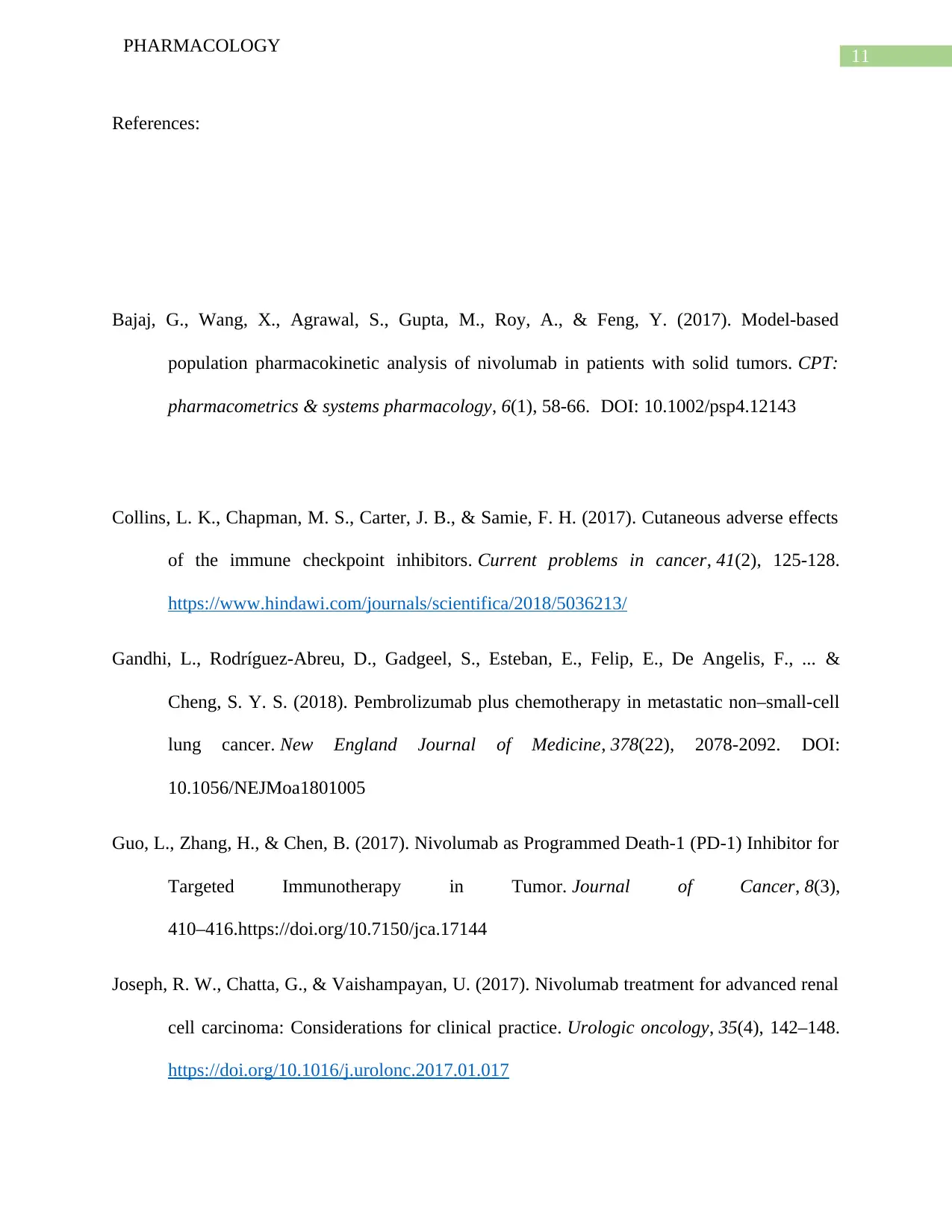
11
PHARMACOLOGY
References:
Bajaj, G., Wang, X., Agrawal, S., Gupta, M., Roy, A., & Feng, Y. (2017). Model‐based
population pharmacokinetic analysis of nivolumab in patients with solid tumors. CPT:
pharmacometrics & systems pharmacology, 6(1), 58-66. DOI: 10.1002/psp4.12143
Collins, L. K., Chapman, M. S., Carter, J. B., & Samie, F. H. (2017). Cutaneous adverse effects
of the immune checkpoint inhibitors. Current problems in cancer, 41(2), 125-128.
https://www.hindawi.com/journals/scientifica/2018/5036213/
Gandhi, L., Rodríguez-Abreu, D., Gadgeel, S., Esteban, E., Felip, E., De Angelis, F., ... &
Cheng, S. Y. S. (2018). Pembrolizumab plus chemotherapy in metastatic non–small-cell
lung cancer. New England Journal of Medicine, 378(22), 2078-2092. DOI:
10.1056/NEJMoa1801005
Guo, L., Zhang, H., & Chen, B. (2017). Nivolumab as Programmed Death-1 (PD-1) Inhibitor for
Targeted Immunotherapy in Tumor. Journal of Cancer, 8(3),
410–416.https://doi.org/10.7150/jca.17144
Joseph, R. W., Chatta, G., & Vaishampayan, U. (2017). Nivolumab treatment for advanced renal
cell carcinoma: Considerations for clinical practice. Urologic oncology, 35(4), 142–148.
https://doi.org/10.1016/j.urolonc.2017.01.017
PHARMACOLOGY
References:
Bajaj, G., Wang, X., Agrawal, S., Gupta, M., Roy, A., & Feng, Y. (2017). Model‐based
population pharmacokinetic analysis of nivolumab in patients with solid tumors. CPT:
pharmacometrics & systems pharmacology, 6(1), 58-66. DOI: 10.1002/psp4.12143
Collins, L. K., Chapman, M. S., Carter, J. B., & Samie, F. H. (2017). Cutaneous adverse effects
of the immune checkpoint inhibitors. Current problems in cancer, 41(2), 125-128.
https://www.hindawi.com/journals/scientifica/2018/5036213/
Gandhi, L., Rodríguez-Abreu, D., Gadgeel, S., Esteban, E., Felip, E., De Angelis, F., ... &
Cheng, S. Y. S. (2018). Pembrolizumab plus chemotherapy in metastatic non–small-cell
lung cancer. New England Journal of Medicine, 378(22), 2078-2092. DOI:
10.1056/NEJMoa1801005
Guo, L., Zhang, H., & Chen, B. (2017). Nivolumab as Programmed Death-1 (PD-1) Inhibitor for
Targeted Immunotherapy in Tumor. Journal of Cancer, 8(3),
410–416.https://doi.org/10.7150/jca.17144
Joseph, R. W., Chatta, G., & Vaishampayan, U. (2017). Nivolumab treatment for advanced renal
cell carcinoma: Considerations for clinical practice. Urologic oncology, 35(4), 142–148.
https://doi.org/10.1016/j.urolonc.2017.01.017
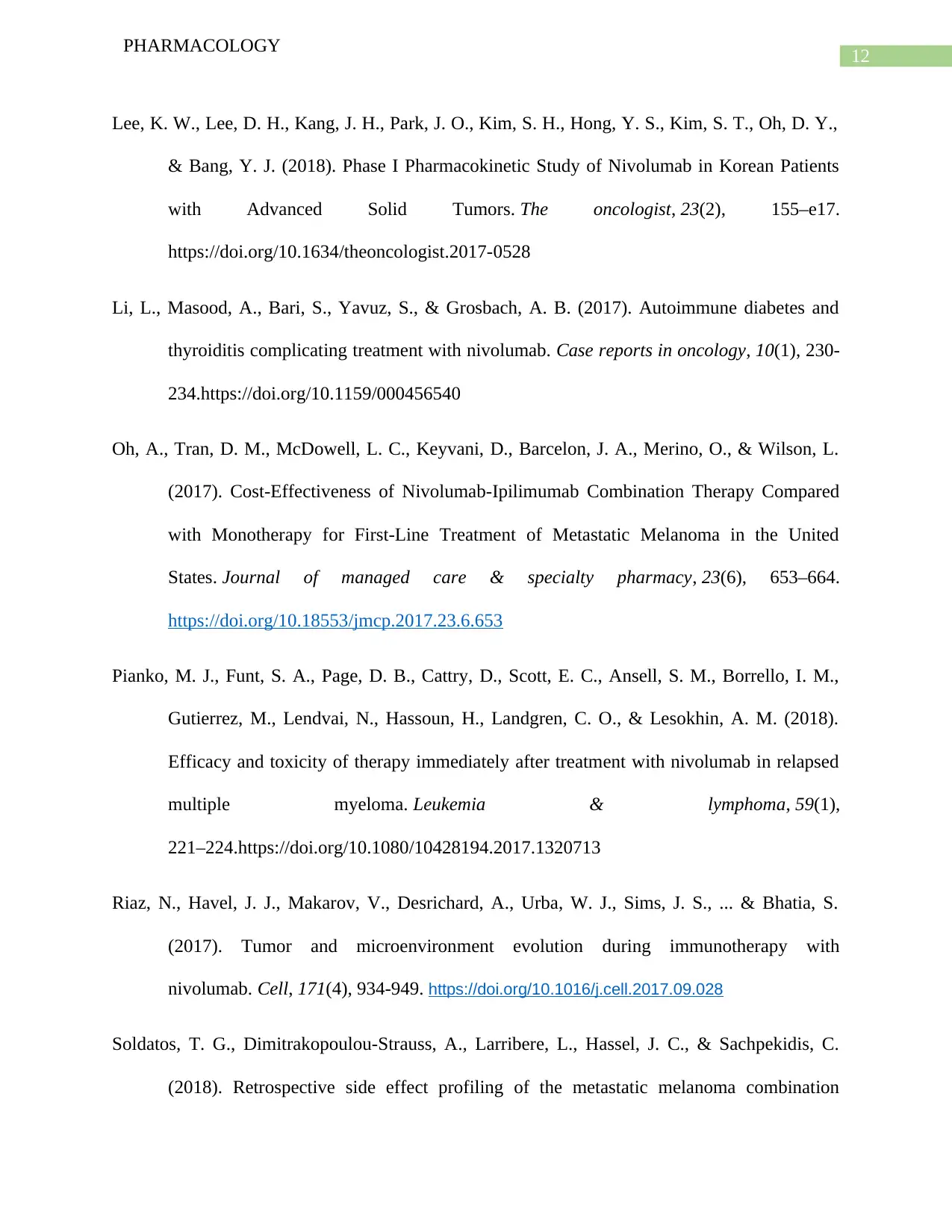
12
PHARMACOLOGY
Lee, K. W., Lee, D. H., Kang, J. H., Park, J. O., Kim, S. H., Hong, Y. S., Kim, S. T., Oh, D. Y.,
& Bang, Y. J. (2018). Phase I Pharmacokinetic Study of Nivolumab in Korean Patients
with Advanced Solid Tumors. The oncologist, 23(2), 155–e17.
https://doi.org/10.1634/theoncologist.2017-0528
Li, L., Masood, A., Bari, S., Yavuz, S., & Grosbach, A. B. (2017). Autoimmune diabetes and
thyroiditis complicating treatment with nivolumab. Case reports in oncology, 10(1), 230-
234.https://doi.org/10.1159/000456540
Oh, A., Tran, D. M., McDowell, L. C., Keyvani, D., Barcelon, J. A., Merino, O., & Wilson, L.
(2017). Cost-Effectiveness of Nivolumab-Ipilimumab Combination Therapy Compared
with Monotherapy for First-Line Treatment of Metastatic Melanoma in the United
States. Journal of managed care & specialty pharmacy, 23(6), 653–664.
https://doi.org/10.18553/jmcp.2017.23.6.653
Pianko, M. J., Funt, S. A., Page, D. B., Cattry, D., Scott, E. C., Ansell, S. M., Borrello, I. M.,
Gutierrez, M., Lendvai, N., Hassoun, H., Landgren, C. O., & Lesokhin, A. M. (2018).
Efficacy and toxicity of therapy immediately after treatment with nivolumab in relapsed
multiple myeloma. Leukemia & lymphoma, 59(1),
221–224.https://doi.org/10.1080/10428194.2017.1320713
Riaz, N., Havel, J. J., Makarov, V., Desrichard, A., Urba, W. J., Sims, J. S., ... & Bhatia, S.
(2017). Tumor and microenvironment evolution during immunotherapy with
nivolumab. Cell, 171(4), 934-949. https://doi.org/10.1016/j.cell.2017.09.028
Soldatos, T. G., Dimitrakopoulou-Strauss, A., Larribere, L., Hassel, J. C., & Sachpekidis, C.
(2018). Retrospective side effect profiling of the metastatic melanoma combination
PHARMACOLOGY
Lee, K. W., Lee, D. H., Kang, J. H., Park, J. O., Kim, S. H., Hong, Y. S., Kim, S. T., Oh, D. Y.,
& Bang, Y. J. (2018). Phase I Pharmacokinetic Study of Nivolumab in Korean Patients
with Advanced Solid Tumors. The oncologist, 23(2), 155–e17.
https://doi.org/10.1634/theoncologist.2017-0528
Li, L., Masood, A., Bari, S., Yavuz, S., & Grosbach, A. B. (2017). Autoimmune diabetes and
thyroiditis complicating treatment with nivolumab. Case reports in oncology, 10(1), 230-
234.https://doi.org/10.1159/000456540
Oh, A., Tran, D. M., McDowell, L. C., Keyvani, D., Barcelon, J. A., Merino, O., & Wilson, L.
(2017). Cost-Effectiveness of Nivolumab-Ipilimumab Combination Therapy Compared
with Monotherapy for First-Line Treatment of Metastatic Melanoma in the United
States. Journal of managed care & specialty pharmacy, 23(6), 653–664.
https://doi.org/10.18553/jmcp.2017.23.6.653
Pianko, M. J., Funt, S. A., Page, D. B., Cattry, D., Scott, E. C., Ansell, S. M., Borrello, I. M.,
Gutierrez, M., Lendvai, N., Hassoun, H., Landgren, C. O., & Lesokhin, A. M. (2018).
Efficacy and toxicity of therapy immediately after treatment with nivolumab in relapsed
multiple myeloma. Leukemia & lymphoma, 59(1),
221–224.https://doi.org/10.1080/10428194.2017.1320713
Riaz, N., Havel, J. J., Makarov, V., Desrichard, A., Urba, W. J., Sims, J. S., ... & Bhatia, S.
(2017). Tumor and microenvironment evolution during immunotherapy with
nivolumab. Cell, 171(4), 934-949. https://doi.org/10.1016/j.cell.2017.09.028
Soldatos, T. G., Dimitrakopoulou-Strauss, A., Larribere, L., Hassel, J. C., & Sachpekidis, C.
(2018). Retrospective side effect profiling of the metastatic melanoma combination
⊘ This is a preview!⊘
Do you want full access?
Subscribe today to unlock all pages.

Trusted by 1+ million students worldwide
1 out of 14
Related Documents
Your All-in-One AI-Powered Toolkit for Academic Success.
+13062052269
info@desklib.com
Available 24*7 on WhatsApp / Email
![[object Object]](/_next/static/media/star-bottom.7253800d.svg)
Unlock your academic potential
Copyright © 2020–2026 A2Z Services. All Rights Reserved. Developed and managed by ZUCOL.





